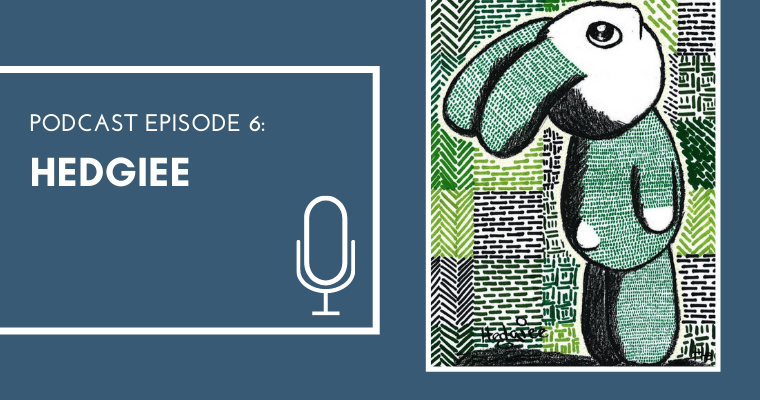NAME: Hedgiee
CREATIVE/ARTISTIC CATEGORIES: Illustration, Photography
Website:
mnartists.org/hedgiee
undocustories.com
SUPPORT THE WORK: SHOP
FOLLOW ON SOCIAL MEDIA:
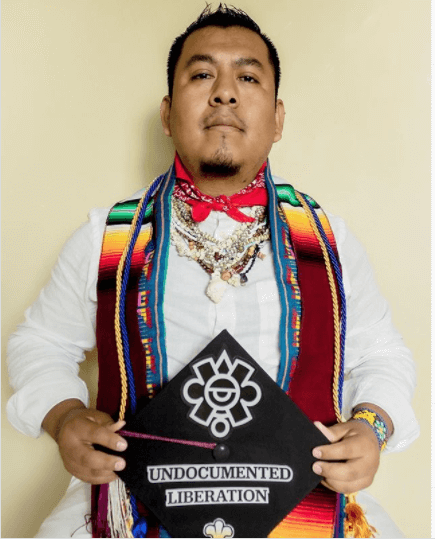
Five Questions with Hedgiee:
What is your favorite art venue?
Art supplies stores ?
What are your favorite art/creation resources?
Politicians, Nature, and Mental health
What local restaurants/take out spots help keep you fed during your creative sessions?
Taco Libre, Mr. Taco truck, Mercado Central
Is there a specific MN non-profit organization you’d like listeners to learn about?
Unidos MN/Navigate MN: An immigrant Led, multigenerational, Latinx based community organization that builds power for gender, racial and economic justice.
Please give a shout out to four other local artists/creators you respect and admire:
- Neil Johnson | Instagram: @paintstew
2. Xavier Tavera | Instagram: @taveraxavier
3. Melissa Borman | Instagram: @melissa.borman
4. Erika Ritzel | Instagram: @erikaritzel
PODCAST TRANSCRIPTION WITH Hedgiee:

The TCDS podcast transcription is sponsored by
Remarque Consulting.
Jennie Eukel (TCDS) (00:00):
Hello and welcome. My name is Jennie Eukel, and this is Twin Cities Design Scene, a podcast featuring conversations with Minnesota artists and creators about their work, career, and inspiration. Today on our show is Hedgiee, an Undocu-artist who was born in the small town of Puebla, Mexico, and came to Minnesota as a teenager. He’s a recent college graduate of Augsburg University, and majored in studio art and marketing. He uses his art to reclaim his humanity and fight for the liberation of his people. His work is to highlight Undocu-stories, to make his community visible. Welcome to the show Hedgiee!
Hedgiee (00:52):
Hi, Thank you for inviting me.
Jennie Eukel (TCDS) (00:53):
I wanted to talk a little bit about your artwork because you have a lot of different types of art and mediums. Do you want to talk a little bit about some of the different types of artwork that you do?
Hedgiee (01:05):
Yeah sure, well, I started using colored pencil, but then I branched out into photography and my thing right now is finding this way to kind of learn more about poetry. Because what I find interesting is that writing can create so many feelings. When just read a line and in the beginning they don’t understand what they’re saying, but once you acknowledge the sentence, it just explodes in your head. And I was just amazed with that. That’s how it started, in the beginning was just trying and trying to do illustrations. And then when I started college, I took a photography class, and I just loved it.
Hedgiee (02:04):
And my professor used to say, “You should pursue a photography career”. And I completely agree with that, because I used to enjoy being in a dark room. And I actually asked my professor, she will teach me more about photography and she’ll be like, the next steps you’re going to have to take, you have to take digital photography. It brought my knowledge of like photography and because she taught me different mediums, not used like digital photography, but also cyanotypes and I just fell in love with cyanotypes. I’m just all over the place.
Jennie Eukel (TCDS) (02:48):
I’m not a photography buff, but what’s cyanotype, you said?
Hedgiee (02:50):
Yes, cyanotype.
Jennie Eukel (TCDS) (02:50):
What Is that?
Hedgiee (02:54):
Basically you put a sensitive coating to a paper and then you place anything you want to put into your image and then just just put it outside in the sun and the sun kind of create your image. And then you go back to the dark room and develop your image. And they’re blue, kind of bluish print out of paper. It was very simple. It’s all processes kind of do photography, but Ijust loved it
Jennie Eukel (TCDS) (03:25):
As far as with your journey into sort of the art world. Tell me about your personal experience and how that influences the way that you approach your artwork.
Hedgiee (03:38):
Because I noticed that there wasn’t a place for me, especially being undocumented. People don’t want to talk about it. So it’s basically a taboo. And there was so many things that I walk into these places and I saw that it was very, “diversity inclusion.” And then when I walked in, I was like, “Wait a minute, you’re not included, right? Because you’re undocumented, you’re not supposed to be in this space.” And I was like, “wait a second. Hold on…” Because of that type of encounters that I found, and especially in the educational system, I wanted to find a way to tell the story. To tell my own story and not just my story, too, also my community story, how can I pursue these type of stories, but without showing their faces, without putting anybody in risk, because people can get deported just being in the spotlight.
Jennie Eukel (TCDS) (04:46):
Yeah you have to consider the privacy factors.
Hedgiee (04:49):
Yeah, instead of just going out and taking pictures of their faces, they had to kind of approach it a different way, work around it, and tell these stories. Because they’re very important. We’re very invisible in any type of field. We’re completely invisible, but we still here. We’re still here, especially here in Minnesota, you haven’t see any undocumented artists presenting in any big museums or any galleries. Because they say, “You don’t exist,” but I’m here.
Jennie Eukel (TCDS) (05:27):
A self-proclaimed Undocu-artist is what you’re talking about, somebody who’s admitting to that.
Hedgiee (05:31):
Yes, and that kind of made me want to disrupt the system, if you’re not inviting me, I’m going to create mine. And then when I create mine I’m going to invite more people, and then it’s going to be diversity inclusive, that was my approach. And people say that my work is very political. Even my body is political. My brownness has become political because even the right and the left, they’ll say illegal aliens are coming here to take our jobs to take our things. We’re basically working for big corporations, and they’re the ones who are taking all the money, and poor people, and undocumented people, they’re just getting into breadcrumbs. And we end up here fighting for these breadcrumbs between the poor and us. And in reality, the big corporation are the ones who are taking all the money. We just need to prove others. What is it for us out there, it’s not me and you fighting, but it’s the system.
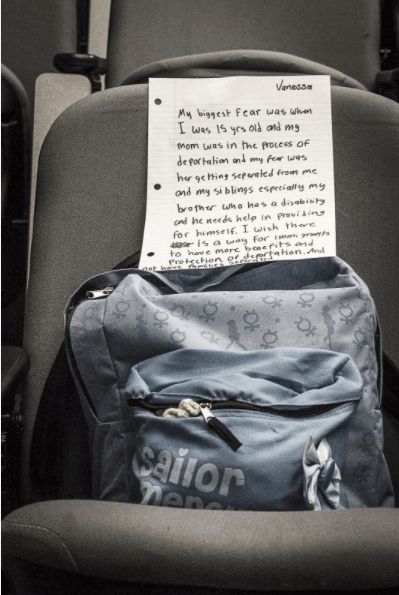
Jennie Eukel (TCDS) (06:39):
As somebody who is undocumented and you hear politicians talking about yourself in such manners. How does that make you feel, how are you able to express that within your artwork? As far as with the influences and the inspiration that you take from your sort of day-to-day life and experiences?
Hedgiee (06:58):
There’s a lot of trauma related to my work and especially mental health issues, such as depression and anxiety. I try to basically take these emotions and put them into a piece of paper. That way it doesn’t affect me anymore. Because just being yourself in this country and just watching TV, going to the store, drive around. It’s always in the back of my mind that somebody is going to tell me, “Go back to your country,” or “You aren’t supposed to be here because you are illegal.” And this term is so dehumanizing and that’s how the Nazis kind of created these general sides for Jewish people. Because they try to dehumanize. And this is a term that it needs to be abolished from legal papers in the United States because we’re basically an object. An object you can do whatever with that. You can basically burn it to the ground because this is an object, so it’s not important. And that’s how some laws and some people see us, that we’re an object.
Jennie Eukel (TCDS) (08:07):
You’ve mentioned as far as with the sort of inspiration that you take is that you really want to emphasize humanizing—as far as humanizing your body, humanizing yourself as a person. So let’s talk a little bit about that too. How you humanize yourself through your artwork and just kind of who you are and even your own story, how I would love to have you express that and tell me a little bit more about that.
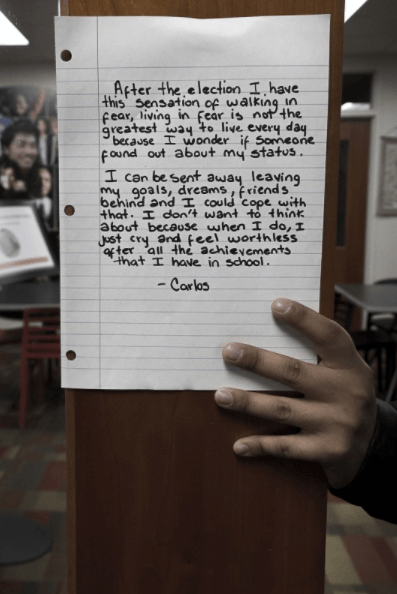
Hedgiee (08:34):
I’m trying to humanize myself and my community because the undocumented communities are very diverse. It’s not only Latinos—there are people from Africa, from Asia, from so many places—they’re still undocumented. And this community is so diverse. And my focus right now is the undocumented Indigenous communities that they’re basically from here—from Latin America, from South, Central, North America. I mean, we were labeled as “the other”—the ones who come came across and started taking over. But my ancestors were here before the people from other places came here. We’ve always been here and there was a certain point where we became undocumented, even though before the ancestors travel from North to South and it was a free trade. But once the creation of the United States, they start putting borders and they started creating these mass incarceration. And I don’t know, you have seen the news, separation of families, and lastly this couple of weeks ago, where these detention centers they are trying to…
Jennie Eukel (TCDS) (10:09):
Are you talking about as far as with the stories as far as with the doctors at the detention centers and the women who are coming out with that? Yeah, I did see that, and I think that as far as what the sort of artwork and the stories that you tell through your poetry and through your drawings, and we’ll talk about a little bit about Undocustories as well in a bit. But as far as, let’s talk a little bit about some of your pieces that you make. So with the ones that you have put out, you have kind of a few characters, we’ll put some pictures on the Twin Cities Design Scene website, but maybe describe a little bit about what, just for someone who’s listening in, who your different characters are and what they represent and furthermore, the sort of stylistic and inspiration that you have for these specific pieces.
Hedgiee (11:12):
I think the first cartoon that I created is right here in the background. His name is Pablo. He’s a rabbit and this cartoon was created because I’m trying to maintain my childhood in these cartoons, because I basically grew up very quick. I had to take care of the business, take care of the family. And I had to, I didn’t have that chance to kind of be a kid. When I was 15 years old, I had to work, I had to send money to my parents. I had to help with the bills here, and then I just ended up by myself. This is the representation that I’m still trying to show that this childhood that I never have is still there. That’s why I like it. You’ve had seen most of my cartoons they look like a kid. That’s me trying to not letting it go. Even though now I’m older, I’m still trying to craft that innocense that it was basically robbed since I was a kid.
Jennie Eukel (TCDS) (12:24):
I think as far as kind of harking back to sort of the trauma-informed artwork too, I mean, that sounds very much being able to take that sort of experience, but putting it out, as you said on paper and essentially expressing something that does kind of give some optimism, give some hope. Let’s talk a little about specifically about the piece called, ‘Seen as Ashes, but Live on Fires’. So this one, I’ll just describe it briefly, but you can take it from here, but it’s your character, Pablo, the rabbit, that is climbing a tree and the tree has all sorts of different branches and there’s different faces within the branches. You know, some are more frightening than others, but you know, perhaps you can talk to me a little bit more about that specific piece and what that means to you.
Hedgiee (13:16):
This is basically the struggle I have internalized since I came here. When I came here, I was trying so hard to belong. Since for, like high school, I wanted to learn English and I wanted to, to be the cool kid and I want to hang out with all the kids. But because I couldn’t communicate, I always got bullied and people say things like, “You’re a pocho,” that pocho means, you don’t know how to speak English and in Spanish. And it was very hurtful kind of path that was experienced once I came here into the States and this is basically the representation of that. I was just trying to belong into these tree. But there was so many things that I have to deal around it.
Hedgiee (14:19):
And there are so many situations that put me to the edge, that always ran me down. And I experienced a lot of anxiety and depression. And this character was a way for me to kind of help myself, keep me out of the hole. Because I was in a really bad shape back in the days. And this is the hope that even though I experienced that, I’m still trying to lift myself up and I don’t know what I’m going to encounter in the future, but that hope is still resembled there into this piece.
Jennie Eukel (TCDS) (15:01):
And that’s kind of what the different branches and the different faces within each branch sort of represent. That piece—what is that made with, is that colored pencil or different?
Hedgiee (15:14):
Yeah, it’s colored pencils and there is this a thick type of paper.
Jennie Eukel (TCDS) (15:23):
It’s a rather good size as far as it’s almost cut out. I know you have it behind you. And again, we’ll put the picture up on the website. Let’s talk a little bit too, about your poetry. You have different mediums that you use and one specifically is poetry and you’re kind of writing to me initially, as far as that you are learning to write poetry, to call out the institutional, systemic racism. With that, I mean, do you have any specific pieces of your, I know I’m putting you on the spot, but do you have any specific parts of your poetry that you want to read off?
Hedgiee (16:02):
Yes, I created this piece that is called, ‘Illegal Identity’. And basically with this poem, I was trying to show that my ancestors became illegal and then I came here and I became illegal and then I was trying to disrupt that word. And then the system created these word called dreamer. And then they put into boxes, these really good immigrant type of thing, even though I was still a thing, I was trying to reassemble that feeling. How does it feel to try and solve this hard to disrupt word. And there’s still tell me you’re the other. When I’m trying to tell them that illegal is a thing and not a person, they still put me these labels that you are an illegal, and people take it like, so personally when they read this poem, because they say, “Oh, you just hate white people.” And I’m like, “I don’t hate white people. I hate the system that they create to oppress other minorities.” That’s the thing that I’m trying to do is— white supremacy is not about you and me. It’s about the system and this poem resembles that.
Jennie Eukel (TCDS) (17:30):
And that’s a system, too, that is it’s so big and it’s so complex. And especially there are so many people that don’t necessarily understand the layers. I think that as far as even starting out at the very basic sort of education on that is really important too, especially in these times of teaching people, what it means to be a racist or anti-racist to even start with, what are the simple things that we can do? And then there’s a larger level of that. That again, voting is one way to be able to try [cross talk 00:18:13] to make that change.
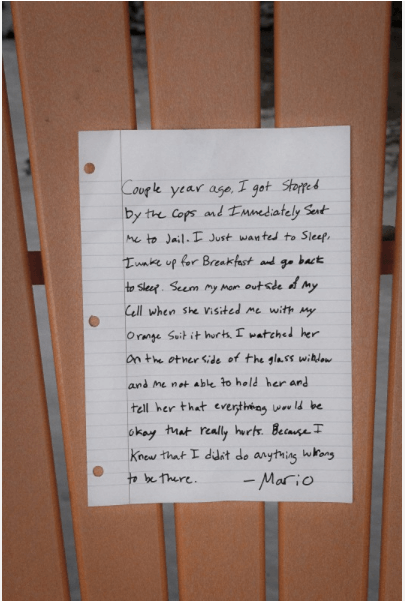
Hedgiee (18:17):
Please, register to vote. Reach out, I’m going to open up my Instagram. You have any questions, please reach out, help me help yourself. Vote, please vote. Register to vote. Because even though some people take it as, “It doesn’t matter.” My life is in the line. So many communities, undocumented community, Black community, LGBTQ+, they’re on the line and you really care about your neighbor, your classmates, your friends, please go vote. Because we don’t want another four years where you’re going to see more kids in cages. We need to stop that, ASAP.
Jennie Eukel (TCDS) (19:01):
And I think as far as with the work that you do too, both in your artwork, but also outside of that, I know that get out the vote is such an important part. And you know, it’s one of those things where I’m sure that there’s this sort of weird balance because technically you can’t put in a vote yourself, but being able to help out others to feel empowered, to be able to make their voice heard, I think is so important because there is a lot of disenfranchisement, which basically people saying as you said, “It doesn’t matter.”
Hedgiee (19:41):
Oh, it’s just one vote, one vote can change this election and please, please go vote.
Jennie Eukel (TCDS) (19:48):
Yes, as far as with the poetry, is there a specific poem or part of a poem that you want to read off?
Hedgiee (19:56):
I’ll give you the last part of ‘Illegal Identity’. If you really support me, you must understand what I have to say because my word has become the few weapons I need to file on. If, you really support me. You must understand the need in this place where I constantly encounter my lack of human rights to claim an identity on my own. If you really support me, you must acknowledge that my fight is not about you. If you really support me, I want you to be clear that we’re losing this battle. When you tell me to stay silent.
Jennie Eukel (TCDS) (20:32):
I think it’s so wonderful and lovely. As far as that you’re putting this out the here and you have such a way of being able to describe your lived experience with others in a way that I think is really helpful for understanding, especially for people who don’t necessarily know much about the undocumented community. You’re trying to make it really accessible. And I want to kind of segue into talking about your Undocustories project, which is where I first met you. You graduated college this year. Congratulations! Which is great!
Jennie Eukel (TCDS) (21:13):
And I was able to meet you through the senior show of the Light Grey Art Lab’s Senior Show, because there’s this pandemic going on. I don’t know if you’ve heard, but that really hindered a lot of seniors from being able to put on traditional art shows, which is a real shame because it’s almost a cumulation of all this time and work and effort. And so Light Grey Art Lab invited graduating seniors to submit their artwork. And you’re one of those. And I was a sponsor and was going to help out, put together a website. And instead of having it, be a portfolio website, I was really struck because you told me, I mean, you kind of said you did not want to do a portfolio site. What did you want to do?
Hedgiee (21:59):
I want to do a platform for the community. Because we don’t have a platform where we can show our work, because many of the undocu-art it’s not just about trauma, about crying, about all these, we have other skills and I want to create this platform for these other artists that they’re coming up, they, some of them they’re still younger and they haven’t seen a platform that. I want to create this place for them.
Jennie Eukel (TCDS) (22:31):
Yeah, and it’s undocustories.com and it was recently launched. And I know that building with future content, but I’m really excited to see that because there’s so many talented people and I can’t wait to see the artwork that comes out of that. As far as with your particular art that you do, there’s so many different stages, you have so many ideas that come to you along the way. And so when it kind of comes along to the creation process, is there a particular part of that process that you just absolutely love to do?
Hedgiee (23:09):
Yeah, the editing part, first you catch the idea, and then you create the work, and you add it and then you present it. The edit part, always get me in trouble always.
Jennie Eukel (TCDS) (23:23):
Why is that?
Hedgiee (23:24):
I want to present all the things that I do, because if somebody gives me one idea to kind of present in, for example, this art show I was supposed to present for my final project in the school. They say do something that’s really impactful for you. And then I went with my photography skills, I was taking pictures. I was doing one-on-ones. It took me one year to kind of create this assignment. And I was doing painting, I was doing charcoal, and pastels and some of the drawings, some of the cartoons. And my professor says, “You can’t do all of this and you’re still taking four classes.” And I’m like, because I love to do this. This is my thing. And I want present in all of them, but he says, “You need to edit, and even though you love all these pieces.” With everything that I do, they’re basically my babies. I don’t just want to disregard them. And that’s the conflicting part between trying to present everything and then edit. And at the end of the day is, what our type of thing requires to present that.
Jennie Eukel (TCDS) (24:38):
You, as I said, you have so many ideas and you have so many different talents and different mediums that I can imagine. It’s a challenge to try to approach a piece and be like, how do you want to tell that particular story, and which sort of particular art mediums do you want to use? Whether it’s the camera, whether it’s poetry, whether it’s drawing, or what have you. I guess for our final question here, what’s the best piece of advice that you’ve received about creating artwork?
Hedgiee (25:11):
These quote is from one of my professors in my first drawing class, he says, “An art piece can create or bring peace to worldwide. It can disrupt system of oppressions, and construct new inclusive forms.” And I was like, “How can that be possible?” In the beginning, I didn’t believe in that quote. But then when he started presenting the type of art in different pieces that they would create during the revolutions, and how people managed to create these pieces, and how these pieces disrupt some systems. I was just blown away. I’m like, wait a second. I can use this.
Jennie Eukel (TCDS) (26:00):
Well, you’ve really taken that as far as that principle at the base of that quote and really applied that to your work and just as far as the efforts that you’re putting forth too, in your personal life. I think that’s amazing. And I think that it has been such a lovely time to talk with you and get to know you, especially these last few weeks. And I’m excited for everyone else to be able to see your artwork as well, because there’s so much heart and so many messages that kind of go into that, that I think drives a lot of awareness. You’re doing a great job. And I just want to thank you again for being on the show today.
Hedgiee (26:36):
Thank you, for inviting me. You have any questions reach out, just don’t hate mail.
Jennie Eukel (TCDS) (26:42):
No hate mail, no one’s allowed for hate mail on this podcast.
Hedgiee (26:47):
My Instagram is open now. Just reach out, you have any questions, especially like about voting. Please do so, reach out, you have questions. I am willing to help you out. I went to a training with these organization guys, Unidos Minnesota. They taught me everything about this process and sadly I can’t vote.
Jennie Eukel (TCDS) (27:06):
They can do other things.
Hedgiee (27:06):
Yes, if you have the privilege to vote. Please vote. So thank you so much again.
Jennie Eukel (TCDS) (27:13):
All right. Thank you so much. You may view Hedgiee work on Instagram at the same handle, @hedgiiee. I’ll have photos and more links to Hedgiee’s work on twincitiesdesignscene.com. Thanks for listening in. The podcast music is, ‘Your Future is My Future’ by Gigamesh. Don’t forget to subscribe to the podcast, we’re on many major streaming services, such as Spotify, Apple music, Stitcher, and Google podcasts. For the latest updates, you can follow along on Instagram and Facebook at twincitiesdesignscene. Till next time!

